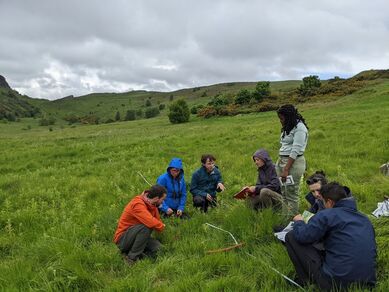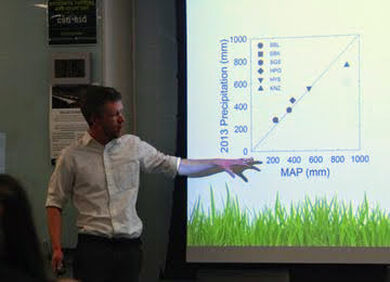|
My primary goal as an educator is to teach students, not content. To this end, I strive to create an engaging and inclusive classroom atmosphere where students are invited to actively participate in their own learning process. This student-teacher collaborative environment allows me to adapt my teaching strategy to facilitate various learning styles and maximize student achievement.
My teaching and mentoring philosophy is grounded in: (1) Active learning approaches, (2) Student-oriented learning outcomes (3) Critical thinking through effective science communication |
As a postdoctoral fellow at Syracuse University, I designed two courses (one graduate, one undergraduate) related to climate change, plant physiology and ecosystem ecology:
BIO600: causes and consequences of climate-driven plant mortality
This is a graduate-level seminar that I organized and taught in Spring 2020. The course material can be found here
Course description: Climate change is causing widespread plant mortality around the globe with immediate and long-lasting implications for biodiversity and ecosystem function. For decades, plant physiologists have sought to answer questions related to how and why some plants survive while others succumb to extreme climate events. In this course, students will survey this broad field of literature to identify several physiological mechanisms of plant mortality (e.g., hydraulic failure and carbon starvation) and investigate potential consequences of widespread vegetation mortality for ecosystem function (e.g. climate feedback, reduced biodiversity, and disruption of carbon and nutrient cycling). Students will also become familiar with the techniques used to assess plant mortality at various scales from leaf-level function to remote sensing and ecological modeling/forecasting. Throughout the course, we will explore how mechanisms/consequences of plant mortality vary across different biomes and plant functional groups with the goal of applying this information to our own research questions
This course led to a collaborative review paper published in Plant Ecology! Check it out here
Course description: Climate change is causing widespread plant mortality around the globe with immediate and long-lasting implications for biodiversity and ecosystem function. For decades, plant physiologists have sought to answer questions related to how and why some plants survive while others succumb to extreme climate events. In this course, students will survey this broad field of literature to identify several physiological mechanisms of plant mortality (e.g., hydraulic failure and carbon starvation) and investigate potential consequences of widespread vegetation mortality for ecosystem function (e.g. climate feedback, reduced biodiversity, and disruption of carbon and nutrient cycling). Students will also become familiar with the techniques used to assess plant mortality at various scales from leaf-level function to remote sensing and ecological modeling/forecasting. Throughout the course, we will explore how mechanisms/consequences of plant mortality vary across different biomes and plant functional groups with the goal of applying this information to our own research questions
This course led to a collaborative review paper published in Plant Ecology! Check it out here
BIO300: Drought Ecology and Climate Change
This is an undergraduate-level course that I organized and taught in Summer of 2020. The course was taught online, so the lecture videos are available on request. You can access the syllabus here
Course description: This course provides an overview of the ecological consequences of drought and explores recent research advances in understanding and predicting how climate change will shape future ecosystems. Drought is characterized by the absence of life-giving water. As Earth’s climate changes due to anthropogenic carbon emissions, droughts will become more frequent, more severe, and longer lasting than they’ve been in the past. The consequences of drought for natural ecosystems are likely to be extreme given the rapid pace at which the global climate is changing. In this class, students will be encouraged to think broadly about how droughts of the future will interact with other ongoing global change factors (e.g., rising temperatures, elevated CO2 concentrations, pollution, habitat destruction) to affect plant ecology and ecosystem function.
Course description: This course provides an overview of the ecological consequences of drought and explores recent research advances in understanding and predicting how climate change will shape future ecosystems. Drought is characterized by the absence of life-giving water. As Earth’s climate changes due to anthropogenic carbon emissions, droughts will become more frequent, more severe, and longer lasting than they’ve been in the past. The consequences of drought for natural ecosystems are likely to be extreme given the rapid pace at which the global climate is changing. In this class, students will be encouraged to think broadly about how droughts of the future will interact with other ongoing global change factors (e.g., rising temperatures, elevated CO2 concentrations, pollution, habitat destruction) to affect plant ecology and ecosystem function.


